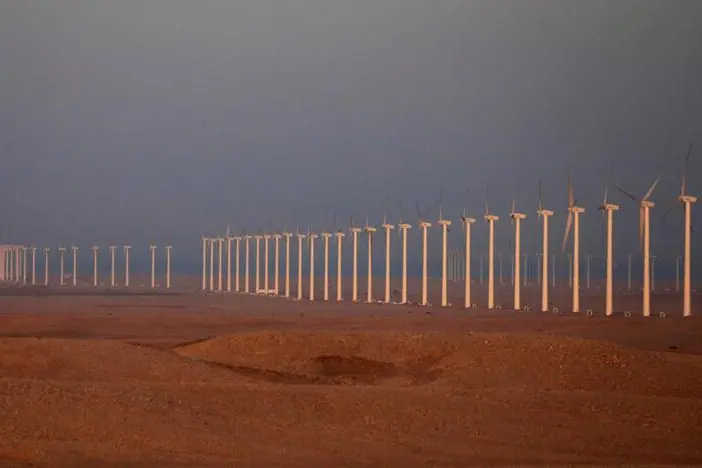PHOTO
In September, the government of Egypt launched the Egypt International Cooperation Forum to highlight investment opportunities for Egypt and Africa as part of a global post-COVID-19 recovery.
President Abdel Fattah El-Sisi spoke about the importance of sparking a “green recovery,” which was echoed by Dr. Rania Al-Mashat, Egypt’s Minister of International Cooperation, who said, “This is a unique opportunity for Egypt to reset global priorities and place sustainability at the core of economic development.”
Egypt’s New and Renewable Energy Authority estimates the country has more than 7,600 kilometres of suitable land for wind farms, which could potentially generate up to 90,000 megawatts of energy, compared to 6,000MW of total renewable energy in 2019. Egypt aims to increase the share of its renewable sources in total energy production to 20 percent by 2022 and 42 percent by 2035.
In April, Siemens Energy signed a memorandum of understanding with the Egyptian Electricity Holding Company to jointly develop hydrogen-based industry in Egypt with export capabilities.
In addition, Egypt can also leverage its regional status to help tame the virus.
“Egypt is uniquely positioned to be a regional hub for vaccine production,” said Solomon Quaynor, Vice President for the Private Sector, Infrastructure and Industrialization, at the African Development Bank (AfDB), “A successful vaccination campaign (in Africa) could help realize the benefits of the African Continental Free Trade Area, a single market with 1.2 billion people and $3.4 trillion in gross domestic product.”
Egyptian Holding Company for Biological Products and Vaccines (VACSERA) signed an agreement in April with Chinese biopharmaceutical company Sinovac, which has already started operations.
“Due to the COVID-19 pandemic and in response to the global need of vaccines, we prepared ‘Factory 60’ inside one of the factories and production lines of VACSERA to produce COVID-19 vaccines in partnership with China’s Sinovac,”Egyptian Health Minister Hala Zayed told state-owned news agency Xinhua, noting that the factory can produce 200 million doses annually.
In addition, a new VACSERA factory complex in Giza’s 6th of October City will feature a vaccine production factory that will be operational later this year, with the capacity to produce a 1 billion doses per year.
Emerging as a regional hub for vaccines will be in line with Egypt’s historical position as a major logistics and shipping hub and a gateway for European and Middle Eastern countries to enter North and sub-Saharan African states.
ECONOMIC REVIVAL
The Egyptian government managed to introduce fiscal measures to steer the economy during the height of the pandemic, enabling the economy to recover more quickly than its peers did. According to the International Monetary Fund, GDP growth stood at 2.8 percent in 2020/21 and is set to rebound to its historical levels of 5.2 percent and 5.6 percent in 2021/22 and 2022/23, respectively, depending on the containment of the virus.
The Egyptian government also saw a $15 billion capital outflow in March and April of 2020 as part of a global investor exodus from emerging markets, but the shock was short-lived as the IMF provided $8 bullion in financial support.
“While growth is expected to rebound in FY2021/22, the outlook is still clouded by uncertainty related to the pandemic and the pace of vaccinations,” the IMF said in its latest assessment of the country’s economic outlook. “High public debt and large gross financing needs leave Egypt vulnerable to external shocks or changes in financial market conditions for [emerging markets].”
In July, Moody’s Investors Service affirmed its B2 rating for Egypt with a stable outlook: “Egypt’s broad domestic funding base and renewed build-up of foreign exchange reserves provide a buffer against volatile capital flows and support the government’s structural economic reform agenda to improve export competitiveness and broaden the revenue base.”
Egypt is also aiming to boost trade ties with its two biggest export markets: the UAE and Saudi Arabia. According to the International Trade Centre, Egypt shipped goods worth $2.86 billion to the UAE last year, compared to $2.1 billion in 2019, making the UAE Egypt’s largest export market. Exports to Saudi Arabia were flat at $1.7 billion each in the past two years. Turkey, another regional neighbour, was the third biggest export market, with shipments worth $1.67 billion.
Saudi Arabia is Egypt’s third largest source of imports after China ($9.05 billion) and the United States ($4.03 billion), with a total flow of $3.82 billion in 2020, according to ITC data. Among other GCC states, Kuwait emerged as the 9th largest source of imports, at $1.98 billion, and the UAE was ranked 14th, at $1.36 billion.
The value of GCC investments in Egypt reached $3.4 billion during fiscal 2019/2020, compared to $2.8 billion in 2018/2019, an increase of 21.4 percent, according to Egypt’s statistics agency, CAPMAS. The UAE was the biggest investor ($1.6 billion), followed by Qatar ($679.4 million), Saudi Arabia ($448.6 million), Kuwait ($347.5 million), Bahrain ($324 million), and Oman ($10.7 million), CAPMAS data shows.
Gulf investors continue to be drawn to Egypt for its 100-million-strong population (making it the Arab world’s most populous nation), an emerging middle class, and infrastructure and investments needs in the area of housing, financial services, logistics, tourism, natural gas, renewable energy and ICT.
In 2019, Egypt and the UAE signed a $20 billion joint strategic platform to invest in some of these sectors, with funding provided by Abu Dhabi Development Holding Co. and Egypt’s sovereign fund.
Egypt is also hoping to showcase its economic reforms and investment opportunities at Expo 2020, which starts in Dubai in October. “It’s going to be a very good opportunity for different countries to discuss collaboration and actually showcase comparative advantages,” Rania Al-Mashat, Egypt’s Minister of International Cooperation, said in a statement to the media.
(Reporting by Syed Hussain; editing by Seban Scaria)
Disclaimer: This article is provided for informational purposes only. The content does not provide tax, legal or investment advice or opinion regarding the suitability, value or profitability of any particular security, portfolio or investment strategy. Read our full disclaimer policy here.
© ZAWYA 2021





















